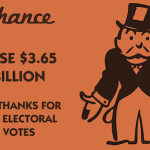Windpower: Focusing the Criticism Away from NIMBYism and Aesthetics
Michael Giberson Market-oriented policy analysts have not been shy about cataloguing the problems surrounding windpower development. But in the enthusiasm to oppose the government interventions accompanying wind generation, market-based analysts sometimes have strayed beyond principled defense of markets and unwittingly offered support to anti-market NIMBYism and other meddlesome sentiments. Policy analysts examining wind power issues should consider more carefully which issues ought to be pursued through the policy process. Two Images Wind power has two images. In one view, wind power is glamorous, hi-tech, future oriented and almost sexy. Advertisements for products from automobiles to...
Obama’s New Energy and EPA Appointments
Jim Lane Ernest J. Moniz is the nominee for US Secretary of Energy In Washington, President Barack Obama nominated MIT professor Ernest J. Moniz as US Secretary of Energy, replacing Steven Chu, and nominated Gina McCarthy as EPA Administrator. Moniz is currently serving as the Cecil and Ida Green Professor of Physics and Engineering Systems, as well as the director of the MIT Energy Initiative (MITEI) and the Laboratory for Energy and the Environment. He was formerly undersecretary of Energy and associate director of the White House office...
McKinsey Report Hits The G(reen) Spot
by Sean Kidney and the Climate Bonds Team Working on climate change involves reading a lot of reports. A lot. My general view nowadays is “Enough already! Can you we just do now and stop theorizing?” But sometimes you come across a report and you find yourself sitting up in your seat and shouting “Yes Yes Yes” like that scene with Meg Ryan in the movie When Harry met Sally. It usually means the report is saying what you’d like to say, but much better; and so it is with the McKinsey Center for Business and...
Did Trump’s EPA Cost Corn Growers $3.65 Billion In 2017?
by Jim LaneIn Washington, new evidence has appeared that a Trump Administration shift on US low carbon fuel policy may have cost US corn growers an estimated $3.65 billion.
The mechanism? A secretive effort by Administration officials installed at the US Environmental Protection Agency that destroyed an estimated 1.37 billion gallons of annual demand for low-carbon renewable fuels, in favor of fossil fuels.
Officials at the agency exploited a loophole in US low carbon fuel legislation that allows small oil refineries to gain hardship waivers in cases of severe distress from complying in full with US low carbon fuel laws. Now, evidence...
The Worst Waste
Jim Lane Peter Brown of FFA Fuels, promotes his company these days with the pithy slogan, “Fuels from the Worst Waste Around.” Which of course raises the legitimate question, what is the worst waste, and can we find a use for it? Discussions of worst waste will usually focus on the obvious say, landfill or the odious say, medical or nuclear waste. Toxicity and longevity are typical concerns, and that’s one of the reasons why nuclear energy remains controversial to this day. No Waste in Nature As LanzaTech’s Jennifer Holmgren observed in a recent article by...
Trump Administration Flip-Flops On Oil Refinery Waivers Again, Farm Groups Protest Again
by Jim Lane
In Washington, what must have become a weary if vigilant posse of the nation’s biofuel and farm advocates are out on the hustings again this week, over a fresh attack on the US Renewable Fuel Standard, this one led by officials in the Trump Administration, if a story reported by Bloomberg stands up against scrutiny.
What has been described as a “misinformation campaign spearheaded by Senator Ted Cruz” is seeking to overturn a unanimous court decision that would halt the Environmental Protection Agency’s abuse of Small Refinery Exemptions (SREs) under the Renewable Fuel Standard.
The backstory
In a unanimous panel, the...
Shifting the Cost of Pollution
by Debra Fiakas CFA The U.S. Environmental Protection Agency has agreed to review the recently enacted MATS Rule - Mercury & Air Toxics Standards that went into effect at the end of 2011. At least two dozen states and forty utility companies have filed suit against the EPA over the rule, which is intended to cap mercury and other toxic emissions as well as particulates. The rules particularly impact power plants that use coal-fired boilers to generate electricity. The EPA provides an interactive map to see where these plants are located. They are predominantly in the eastern half...
Another Biodiesel Plant Gets The Axe. Here’s Why.
by Jim Lane
In another small but sharp blow to the Trump Administration’s strategy for American manufacturing revival, news arrives from Texas of a second smaller biodiesel shuttering owing to “ challenging business conditions and continued federal policy uncertainty,” as Renewable Energy Group (REGI) phrased it in announcing the closure of its15 million gallons per year New Boston, Texas biorefinery. The company is currently working with plant employees on relocation opportunities within the production network.
The tax credit issue
The forces impacting the US biodiesel industry at present are complex, but REG in this case is pointing the blame at the biodiesel tax...
How New England Can Eliminate Oil Use For Single Family Homes for Less Than...
Chris Williams We can use simple, effective, and proven policies that have been used to supercharge the New England solar PV industry to incentivize renewable thermal technologies and eliminate oil use for single family homes. Here's the best part, the policies will be cheaper than solar PV, they will create more local jobs per kW installed and displace more expensive fuel. At Renewable Energy Vermont 2012, I delivered a presentation on how a production-based incentive for renewable thermal technologies, like the $29/MWh incentive in New Hampshire, would be cheaper than the current solar PV incentive in Vermont and...
Obama’s Climate Plan
James Montgomery Yesterday President Obama spoke at Georgetown University about his plans to broadly address climate change. Ahead of his actual talk, the White House released the gist of what he would propose. The EPA, working with states, industry, and other stakeholders, will establish new carbon pollution standards. "Tough new rules" will be established similar to those that exist for toxins like mercury and arsenic. These new rules, as anticipated, will target existing power plants as well as new ones. The federal government will make available up to $8 billion in loan guarantees for "advanced...
Overcoming Hurdles to Clean Energy Commercialization
by David L. Levy In the absence of a global framework for regulating emissions, the future of the planet largely rests on choices by private firms and investors regarding which technologies to pursue and commercialize. Despite the mounting evidence of severe climate change, there is a funding crisis for potential solutions. The Department of Energy released data at the beginning of November showing that global emissions of CO2 rose 6% in 2010, despite the ongoing economic recession. This trajectory is higher than the worst case projections from the Intergovernmental Panel on Climate Change (IPCC) in it’s 2007 Fourth...
Solar Trade Case Analysis and Implications
by Paula Mints
In terms of the current trade petition and the USITC decision, government interference will not correct an imbalance that is embedded in the industry (globally) particularly when it is put in place by a body that does not understand the nuances of the problem. Despite evidence to the contrary, attorneys and consultants for Suniva/SolarWorld seem to have convinced the USITC that cell manufacturing in the US can be resuscitated and that tariffs and quotas the mechanism that will stimulate manufacturing. In reality, this situation is stimulating uncertainty and doing harm.
Table 1: Tariff Recommendations
...
A Portfolio Risk Wall Street Ignores at Its Peril
Garvin Jabusch At Green Alpha, we believe in investing in the scientifically objective world, and not an ideologically skewed version of it, so I’m often amazed at the attitudes and behavior of many of our colleagues in the financial services industry. For a group that’s supposed to be practicing objectively quantified decision making, finance-types can be remarkably motivated by ideology. Especially where a particular ideology is being promoted by the largest and richest industry in the history of civilization, fossil-fuels, whose representatives will stop at nothing to convince us that their product is safe, causes no warming, and will...
From Paris to Drawdown
by John Fullerton Yes, it was a shameful poke in the world’s eye by the dangerously narcissistic, temporary occupant of the White House. Like other unconscionable and unfathomable acts of the early 21st centurya period of historic great change alreadyTrump’s pulling out of the Paris Climate Agreement has sent me searching for the deeper meaning of it all, while the pundits flail away. The attack on the World Trade Center, an iconic symbol of globalization if there ever was one, triggered for me a period of introspection and a personal existential crisis as it opened up...
350.org’s Smart New Campaign
Garvin Jabusch Many parallels exist between the college campus divestiture campaigns of the 1980s and today. Both were/are seeking to apply intense student and community pressure to persuade boards of trustees to get endowment monies out of investments in businesses or locations perceived as undesirable. In the '80s it was South Africa and Apartheid that students objected to. Back then, one could almost conceive of college students versus a beleaguered South African government as something of a fair fistfight between entities with comparable chances of winning popular opinion and thus investment dollars to their side. And indeed the students...
What the ARRA Means for Clean Energy: One State’s Example
Last week, several branches of the Colorado state government organized a symposium on "How Colorado Electric/Gas Utilities and Their Customers Can Benefit from the American Recovery and Reinvestment Act (ARRA)." I attended, with an ear to how the likely implementation would affect Clean Energy Stocks. Overall, Colorado seems to be taking a very organized approach to a monumental task. According to Colorado Public Utilities Commission (PUC) Chairman Ron Binz, who officiated at the conference, they intend to organize proposals into an overall thematic plan for spending stimulus money. In addition, they are working to eliminate barriers to regulated utilities...





